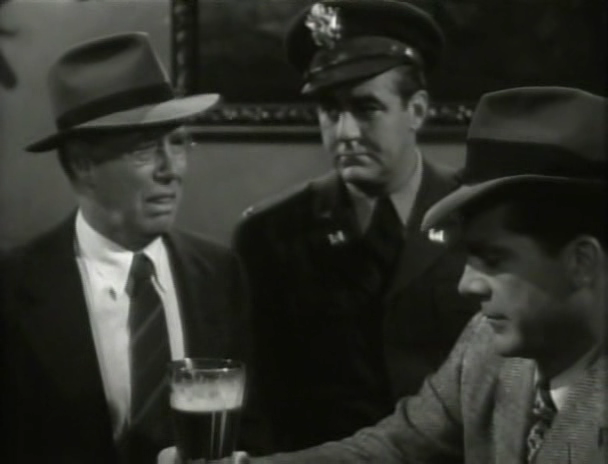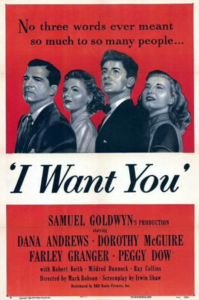|
Genres:
- Cold War
- Dana Andrews Films
- Dorothy McGuire Films
- Family Problems
- Farley Granger Films
- Korean War
- Mark Robson Films
- Mildred Dunnock Films
- Small Town America
- Veterans
Review:
Made to capitalize on the success of Samuel Goldwyn’s Oscar-winning The Best Years of Their Lives (1946), this sincere tale of life on the American homefront during wartime rings true in many ways, despite its failure to reach the emotional heights of its acclaimed predecessor. Dana Andrews returns in a starring role as a small town father, son, and brother who is proud of his status as a WWII veteran, and happy to finally be able to enjoy life with his wife (Dorothy McGuire) and two children. When the Cold War heats up in Korea, however, and the draft board comes knocking harder than ever, he’s faced with some tough decisions: will he write a letter of “indispensability” for the father of a fresh-faced 19-year-old employee at his factory? Will he write the same letter for his own brother? Will he volunteer his own services once again? These challenging themes are handled respectfully and powerfully; it’s especially refreshing to see Granger standing up to the draft board, voicing his skepticism of America’s involvement with another country’s civil war (though naturally, all attitudes turn patriotic by the end of the movie).
In addition, there are several quietly powerful scenes involving the wives of Andrews and his WWI veteran father (Robert Keith); it’s nice to see Mildred Dunnock (playing Keith’s loyal wife) given another meaty supporting role after her Oscar-winning turn the same year in Death of a Salesman (1951). Unfortunately, however, the primary subplot — involving Granger’s romance with a “college girl” (Peggy Dow) whose parents consider her too good for him — is both dated and cliched, and takes up far too much screen time. (With that said, fans of Dow’s performance as loopy, love-struck Nurse Kelly in Harvey (1950) will surely enjoy seeing her in an even more substantial supporting role — especially considering that she gave up Hollywood permanently to become a housewife and mother shortly after this film was released). While it hasn’t endured as a must-see classic, there’s enough affecting material in I Want You to make it worth a look at least once, and fans of The Best Years… will surely want to check it out.
Redeeming Qualities and Moments:
- An affecting look at homefront sentiments during a draft

- Harry Stradling’s cinematography

Must See?
No, but it’s recommended for one-time viewing. Listed as a Sleeper and a Personal Recommendation in the back of Peary’s book.
Links:
|



2 thoughts on “I Want You (1951)”
A once-must, as a quietly compelling depiction of how war affects those about to enter it, as well as those they love.
I suppose the rather-unexpected title for a film of this sort has a double meaning: on the one hand, it could refer to those who want men to stay home instead of going off to war; on the other hand, it could be a reference to the famous recruiting station poster of ‘Uncle Sam’ actually pointing to ‘You’. At any rate, it’s such a tricky title, that one could be forgiven for believing beforehand that it’s a silly love story.
Of course, it *is* largely a love story – and, admittedly, the Granger/Dow subplot is not the best (or main) reason for seeing the film. (I don’t particularly think that element takes up an inordinate amount of screen time.) The strength here lies in the many very believable sequences which reflect an anti-war stance. Although the various characters reveal a range of emotions as they describe the reasons war affects them personally, perhaps the most memorable scene comes midway – when McGuire lashes out at Granger for his immature and “selfish” attitude about the cruel reality of war (while simultaneously hating that reality as much as any normal person would).
Dunnock’s own ‘mad scene’ is also something of an eye-opener.
‘IWY’ could perhaps suffer from existing in the shadow of ‘The Best Years of Our Lives’. But I don’t particularly find it an inferior film in any way. I see it as another side of the same story, and commanding in its own right.
I’ll give this a once must. Interesting thoughts on the comparison to “The Best Years of Our Lives” – definitely similarities, but this shows the “before” (even though it was interesting that WW II was fresh on the minds of the characters – including some getting redeployed) while “Best” shows the after.
I liked how it showed commitment and duty while also showing the danger and consequences of active duty. While the “young” romance wasn’t my favorite part of the film, it didn’t change my opinion of the film (or distract from it).
The reason I give this a one time must watch is the story, the characters (I cared about them), and the time period it depicts. A good film.